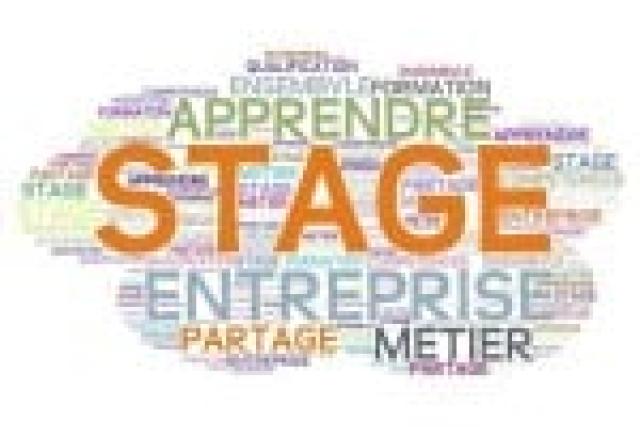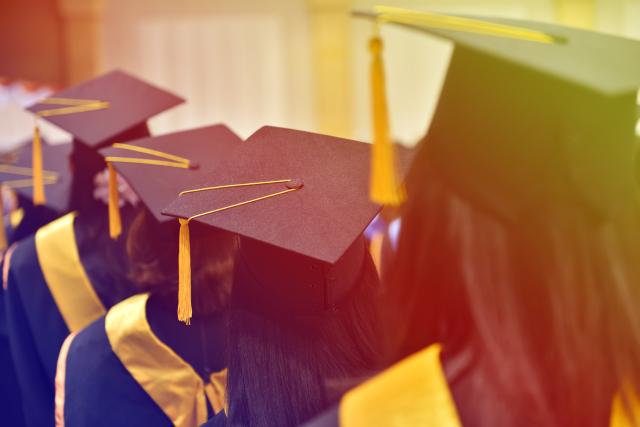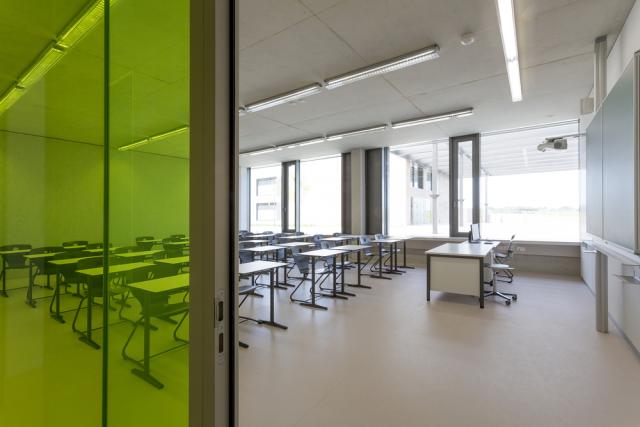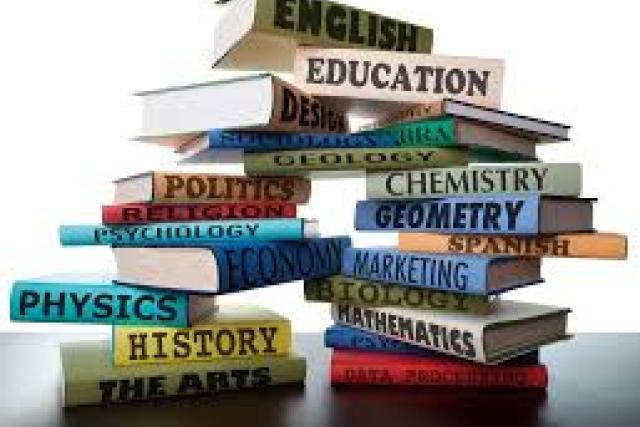Secondary cycle
Pupils who have successfully completed their 5th year of primary education at our school or at a European school are admitted to the 1st year of secondary education.
The secondary curriculum will continue for seven years and will culminate in the award of the European Baccalaureate.
Pupils who have not followed a European primary curriculum are admitted to the 1st year of the European secondary cycle if they meet the conditions of their country of origin (see table of equivalences annexed to the General Rules of the European Schools).
The special feature of secondary education is that children are only admitted to the language section of their mother tongue or dominant language. Our secondary school offers 6 language sections.
The secondary school has a capacity of 1600 pupils and is managed by a deputy head.
Secondary School Divided into Three Cycles

The seven years of Secondary School are divided into three stages, or cycles. For the first three years of the Secondary School cycle, students follow a common curriculum referred to as the “cycle d’observation” or Observation Cycle. Most subjects are taught in the student’s first language.
Starting in the first year of the Secondary School cycle, all students choose a second foreign language (L3) to study. In the second year of Secondary School, Latin is offered as an option. By the third year of Secondary School, humanities courses and Religion or Morals/Ethics classes are taught in the student’s first foreign language (L2). Students who chose to study Latin in their second year continue those classes. For the other students, a computer science class (ICT) is offered.
The 4th and 5th years of Secondary School form the second cycle. By this time, general science classes are subdivided into physics, biology, or chemistry. Students may also choose between regular and advanced mathematics. Other course options include economics, a third foreign language (L4) and ancient Greek.
The sixth and seventh years of Secondary School form the third cycle and work together as preparation for the Baccalaureate. There is still a mandatory core curriculum that includes first language, first foreign language (L2), math, one of the sciences, philosophy, physical education, history, and geography. Students may also choose from a wide array of elective classes that are offered for two periods, four periods, or at an advanced level.
Students are regularly evaluated, with report cards being sent home three or four times each year. Assessments are based on both class work and exam results. Official exams, however, are not given during the Observation Cycle of Secondary School. At the end of the school year, specific criteria set by the Board of Governors are used to determine a student’s eligibility to pass into the next grade level.
S5 Work experience program

Among the essential pedagogical axes that it favors, the European School of Luxembourg II encourages the personal, social and intellectual development of its students.
For this reason, we wish to offer students a realistic and rewarding approach to the world of work and business.
Therefore, students in the 5th year of secondary education are required to participate in the Work Experience program and obtain an internship of 2 weeks.
The internship is mandatory for all students in S5.
This internship takes place during the last two weeks of the school year, right after the end of the S5 written examinations.
It will be the subject of a signed Internship agreement between the parties, a Report and an Evaluation by the employer.
For all information regarding the procedure, please check: WEX 2025-26_0
For any other questions, we kindly ask you to send your messages to the following email address: MAM-STAGE@EURSC.EU
The European Baccalaureate Cycle

The European Baccalaureate cycle comprises the two last years of Secondary School (S6 and S7) in the European Schools or in schools accredited by the Board of Governors.
This final cycle consists of a comprehensive multilingual curriculum. Students must take a combination of language, humanities, and scientific courses, with subjects taught through more than one language.
The core curriculum consists of the following compulsory subjects, some of which can be taken at different levels of complexity:
- At least two language subjects (the dominant language and another one)
- Mathematics, either 3 periods/week or 5 periods/week
- One scientific subject, either Biology 2 periods/week or any other 4-period scientific subject in Biology, Chemistry or Physics
- History and Geography, either 2 periods/week or 4 periods/week, which are taught through a different language from the dominant one, either in French, English or German.
- Philosophy, either 2 periods/week or 4 periods/week
- Physical Education
- Morals/Ethics or Religion
In addition to the core curriculum, pupils have a wide range of options and complementary subjects they can choose from to complete their program, which must total a minimum of 31 periods per week and a maximum of 35.
Buildings

A wide range of modern facilities to ensure the optimum development of young people in secondary education, in particular through :
- All classrooms are equipped with interactive whiteboards to enable pupils to follow interactive lessons using modern learning technologies;
- 5 music rooms with a wide range of instruments are available to pupils for music lessons. Between the art of instruments and the art of singing, our pupils have the opportunity to develop their artistic curiosity;
- 5 art education rooms enable pupils to perfect their introduction to the various plastic arts, as well as specialising in optional subjects;
- Computer rooms that bring together all the resources needed for technology, information and communication in a space specially designed for students;
- 23 fully-equipped and secure science laboratories where students can discover the different sciences;
- The secondary school library has thousands of books in several languages to meet the needs of each of the school's language sections. Pupils can borrow books from the library, take advantage of reading breaks, access computer workstations and much more;
- A self-service canteen and cafeteria where students can choose to eat either a hot or cold meal, and where snacks and drinks are available throughout the day.
- A relaxation room is available for secondary school pupils. Whether it's playing games, chatting, socialising or simply resting, this room allows students to take advantage of their break time with their classmates, while respecting the well-being of all and the rules of the school.

